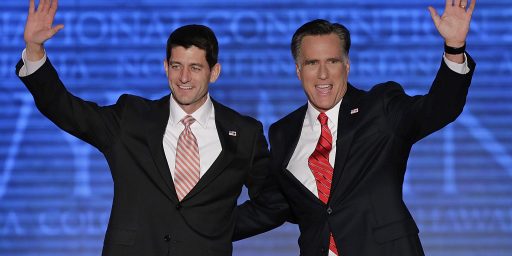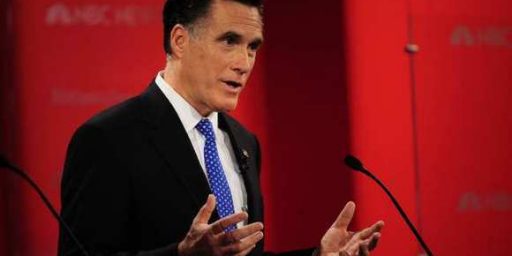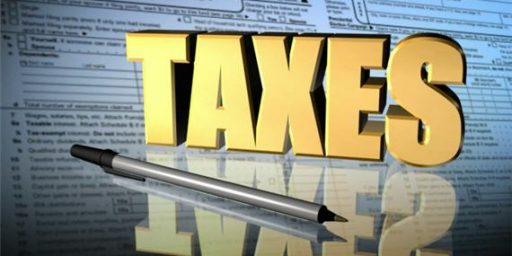AMT as a Stealth Flat Tax
University of Maryland economist Robert H. Nelson argues that the controversial Alternative Minimum Tax is a good thing because it is, in a sense, a stealth version of the flat tax.
The AMT is viewed by many as a bad thing. Yet, consider this: There is wide agreement among economists on the benefits of a federal “flat tax” on income that would apply a uniform rate to every taxpayer and eliminate most current deductions and tax credits. A flat tax would get rid of a large number of economic distortions resulting from the many tax “subsidies” that often benefit narrow interest groups. This is tax “pork,” and Congress is as addicted to it as to the ordinary spending kind.
While I personally find a “flat tax” intriguing as a baseline, to say there is “wide agreement among economists on the benefits” is misleading. They surely agree on the benefits but by no means is there widespread support for the idea. Indeed, I’d wager most support progressivity on principle. [Update: Kevin Drum agrees and puts it more strongly: “As Nelson surely knows, there’s wide agreement among economists that a broadly-based tax that minimizes exemptions and loopholes would be economically efficient. However, there is no agreement at all that having a flat rate is a good thing. It’s wildly dishonest to say otherwise.” Elsewhere, economist Mark Thoma is decidedly not part of the wide agreement, either.]
In places around the world, including Eastern Europe, governments creating new tax systems have been turning to a flat tax to avoid this sort of thing. What does this have to do with the AMT? Just this: As Post business reporter Albert B. Crenshaw has noted, the AMT “approaches a modern-day flat tax.” It imposes a uniform rate of 26 percent up to $175,000 in income, and above that 28 percent.
Tax revolutions are few and far between. Taxes are so important to the economy that major changes in tax law are best achieved incrementally, giving notice well in advance and avoiding potentially large disruptions from big surprises. That’s part of the genius of the AMT. If it is left alone, it will move us gradually but steadily toward a flat tax on income as inflation brings more people within its ambit.
Some leading Republican conservatives have long advocated a flat tax. Yet few of them are speaking out vigorously for retention of the AMT. In fact, many are joining the clamor in Congress for its repeal or limitation. It would seem that they were either hypocritical in advocating a flat tax or have somehow failed to recognize that the AMT is in essence a new, evolving form of flat tax.
Well, no. First, no Republican that I know of advocates a flat tax in the 26-28 percent range; most talk about one between 10 to 15 percent. For the federal government to take over a quarter of one’s income off the top, with no deductions, is confiscatory. Second, one can simultaneoulsy think a policy a good idea and oppose doing it covertly. The AMT’s critics find it outrageous that we set up a system encouraging people to make certain economic decisions–buying a house, making charitable donations, investing in education, an so forth–and then have a backdoor trap wherein those benefits are stripped after the money has been spent.
If the present AMT rates were applied as a universal flat tax — and especially if the AMT exemption were reduced and certain remaining AMT exclusions eliminated — the resulting federal revenue might even come to exceed current expenditure levels. The solution would then be to reduce the flat tax rate (the AMT rate) so that revenue and expenditures were brought back into balance.
So, the lure isn’t so much a flat tax but a massive tax hike. And the worst kind, at that: One enated by the vagaries of inflation rather than by the direct action of the elected representatives of the people. Further, we can rest assured that, if federal revenue rises, federal spending will do so as well.
________
Related:






Of course, an above-board adoption of the flat tax–on the model proposed by Denny Hastert–would also be a massive tax hike for most people.
If the left is so upset about NSA listening programs, why are they so happy about the massive invasion of privacy involved in our current tax system? The more I look at it, I think doing away with the income tax and going to a national sales tax makes the most sense. If the poor need a rebate, then they can disclose the personal information required to get the rebate. The rich who consume more will pay more in taxes.
As Drum points out, there is a fundamental difference between tax exemptions and the tax rate.
Tax simplification, the elimination of exemptions and loopholes is a wholly separate issue from determining what the rate structure should be. Inherint to the Forbes flat-tax scam was the effort to sell the virtues of a simplified system while essentially shifting a huge tax burden from the wealthy onto the middle class, by lowering the higher rates for upper brackets down to a single common rate. In any revenue-neutral implementation, this can only mean a tax increase for the average taxpayer and a tax cut for the better off. Nelson seems to want to take this scamming to the next level – lets put it in place without even having to vote on it.
The mortgage interest deduction was not set up to encourage people to buy a home. It’s a leftover from times when all interest was deductible. It should be done away with as it does little more than artificially increase the price of homes.
It wouldn’t still be around but for the lobbying efforts of certain industries.
Haudidoody: Whatever the original intent of the home interest deduction, the reason it has survived is because it has a huge middle class constituency. People made purchasing decisions–in most cases, the biggest one they’ll ever make–based on that deductability. It would be quite injust to simply repeal it; at best we could phase it out for future purchases.
What I looked forward to in a flat tax was simplification and the AMT does not provide it. I still have to calculate the 1040 and all it’s attached schedules and at the end then pay the highest of the two calculations. This is a waste of everyone’s time.
Nice post – much of which I add (favorably) to my Angrybear post today. Forgive me if I did not include the last sentence as I’m not one of those feed (starve) the beast theorists.
Heh. I’m not sure I’m a “feed the beast” theorist. I think of federal spending much the way Cap Weinberger thought about arms control: “We build, they build. We stop, they build.”
Either way, Congress is spending more than they take in!
As far as I see it, what is considered “welfare” depends on what tax bracket you’re in. The middle class mortgage tax deduction is basically welfare entitlement. So is the reduction in capital gains taxes. If you really want a fair tax system all of these “loopholes” need to be reduced or elimintated. I’m doubtful that a true flat tax along with elimination of sales taxes would balance out to be fair, but there are a lot of people who have plenty of money to pay taxes that get away with paying less their fare share because of deductions. We should be saying, if you make enough money to pay taxes you should be proud. Right now everybody just tries to avoid it and get away with paying nothing or getting a refund. There is no sense of responsibility.